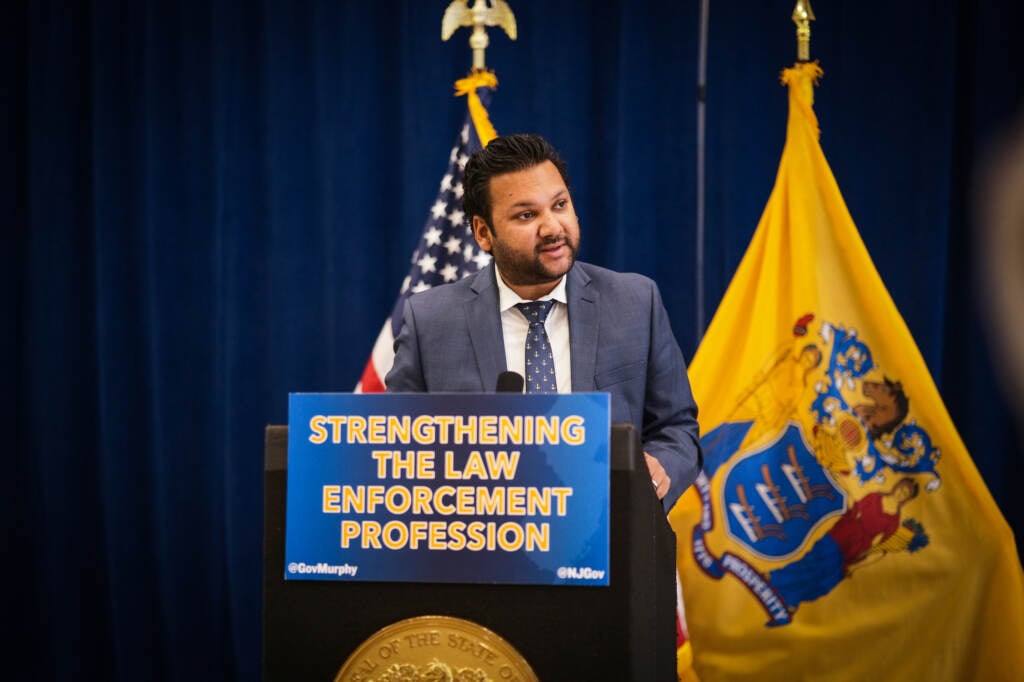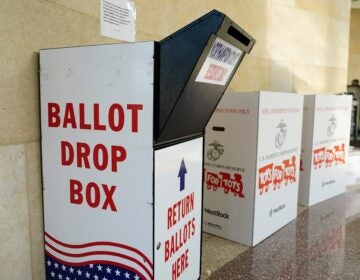N.J. becomes 47th state to require police officers to obtain a license
Under the new law, licenses will not be issued to people convicted of crimes or active members of anti-government and hate groups.

Governor Murphy signs legislation creating a system of licensing for law enforcement on Thursday, July 21, 2022. (Edwin J. Torres/NJ Governor’s Office).
New Jersey Gov. Phil Murphy signed a law on Thursday requiring all law enforcement officers to obtain a policing license in order to be employed as officers in the state.
The state’s Police Training Commission will operate the licensing program.
“It will be a strong signal to the community that transparency and accountability matter,” Murphy said at a signing ceremony in Secaucus. “And these are the foundational principles for rebuilding the bonds of trust between police and the residents they serve, especially not only, but especially in our Black and brown communities.”
Under the new law, licenses will not be issued to people convicted of any crime in New Jersey, or anywhere in the U.S. — including domestic violence-related and firearm-related offenses.
Licenses will also not be issued to active members of anti-government groups or groups that advocate for discrimination as listed by the state’s Law Against Discrimination.
The state can revoke an officer’s license for any of the aforemention reasons as well as for misconduct in an officer’s personal or professional life like ”making statements, posting, sharing, or commenting in support of any posting, on social media, or otherwise, that demonstrates, espouses, advocates or supports discrimination or violence against, or hatred or bias toward individuals or groups based on race, creed, color, national origin, ancestry, sex, marital status, sexual orientation, gender identity or expression, or any other protected characteristic under the “Law Against Discrimination,” according to the Governor’s Office.
“We know that even one instance of abuse of authority from one officer can taint the honest efforts of an entire department. Being a member of New Jersey’s law enforcement family is a privilege. It is not a right and this new license will send a strong message that the person entrusted with it takes this privilege seriously,” Murphy said.
Assemblywoman Verlina Reynolds-Jackson (D-Mercer) was one of the law’s primary sponsors.
“Many professions require licensure and are held accountable if they are in violation. The job of law enforcement is as critically important to our communities as the work of doctors and lawyers. This law will raise the level of professionalism that is required to serve our communities in any situation,” Reynolds-Jackson said.

Advocacy groups praised the new measure. Though, some called on the state government to pass more police reform.
Amol Sinha, executive director of the ACLU-NJ, said the state should pass reform that creates better transparency over police disciplinary records, allows municipalities to create civilian review boards with subpoena power, and ends qualified immunity for public officials and law enforcement officers.
“New Jersey lags behind among the few states that keep police disciplinary records hidden from the public,” Sinha said.

Officers will be required to renew their license every three years.
New Jersey is now the 47th state to enact a police licensing program.
According to Bloomberg Law, California, Massachusetts, and Rhode Island currently do not require officers to obtain a license.
WHYY is your source for fact-based, in-depth journalism and information. As a nonprofit organization, we rely on financial support from readers like you. Please give today.








